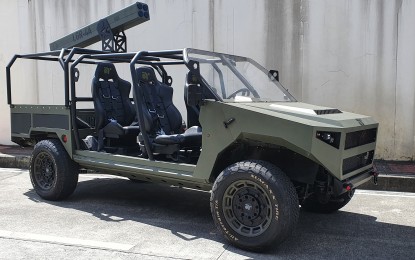
FAST AND FURIOUS. The Charlie Cruiser, made in Malabon City by Anos Research Manufacturing, is outfitted with a launcher that accommodates 70mm guided missiles or unguided rockets. Local defense manufacturers are appealing to the Philippine government for more incentives to hasten their expansion. (Photo courtesy of Anos Research Manufacturing)
MANILA – Investors in the indigenous defense sector are appealing for more fiscal and legal support amid recent geopolitical developments.
In an interview on Monday, Stephen Anthony Garcia, vice president of sales and operations at Anos Research Manufacturing (ARM), cited a provision in the Philippines Defense Acquisition System (PDAS) that limits purchases to weapons that are already widely issued internationally.
He said the policy discriminates against local startups or even established companies that have not yet vied for state contracts.
He noted that PDAS, which is being implemented by the Department of National Defense (DND), mandates “that no major equipment and weapons system shall be purchased from any vendor if the same are not being used by the armed forces in the country of origin or used by the armed forces of at least two other countries.”
“It’s like when a fresh graduate applies for a job but all the vacancies require at least two years of work experience or the candidate won’t even be considered. The Philippines cannot develop a defense industry of its own if its government doesn’t give local manufacturers a break,” Garcia told the Philippine News Agency.
A recent encouraging development, he said, was when Senator Sonny Angara initiated hearings on amending Republic Act 9184 or the Government Procurement Reform Act and invited defense industry stakeholders to share their insights on making the law more inclusive.
ARM is a family-owned business based in Malabon that has been producing fire trucks since 1995, but has recently ventured into making light armored vehicles in hopes of landing a military contract.
One of its originals is Charlie Cruiser, a light multi-purpose armored vehicle that can be reconfigured to match its intended mission, assuming the roles of troop carrier, missile launcher, ambulance, or armored fighting vehicle for PHP3.6 million on the basic model.
ARM chief design officer John Martin Garcia said they donated one of the two original Charlie prototypes to the Presidential Security Group in 2023 in hopes of sparking the military’s interest in the locally made squad vehicle.
“It’s worth mentioning that governments of our neighbors like Indonesia and Thailand are giving all kinds of support to their defense companies… allowing them to develop their capabilities quickly. It’s all about political will,” he noted.
Fair share
Hector Rodriguez, president of Metro Arms Corporation (MAC), said the passage in January of House Bill (HB) No. 9713 or the Philippine Self-Reliant Defense Posture gave hopes to domestic producers of small arms and ammunition that they will soon be getting a fair share of government contacts.
He explained that while Philippine gun manufacturers have traditionally catered to the commercial and export markets, they can easily expand their production capacities to satisfy the requirements of government security forces if the demand materializes.
Rodriguez noted that business opportunities of this magnitude will necessitate that gun manufacturers hire thousands of highly skilled workers.
Parañaque-based MAC has been manufacturing mostly pistols for private citizens and competitive shooters since 2006, but it is set to expand its product line to include semi-automatic rifles chambered in military calibers.
“I think they (government decision-makers) are realizing that the Philippines needs its own defense industry… we have to develop a higher degree of self-reliance because being completely dependent on imported materiel is not a good position to be in… especially in times like these,” he said.
More tax incentives, setting aside a certain percentage of firearms purchases for local manufacturers, and permitting negotiated purchases under certain conditions is a good way to invigorate the domestic defense industry, Rodriguez said.
HB 9713, approved with a vote of 194-3 and no abstentions, aims to support the country’s defense force through military and civilian partnership and local production of materiel (military technology), materials, and equipment including arms and ammunition and combat clothing.
The bill says importation will only be resorted to for requirements that cannot be locally produced while providing government support to the technical and financial needs of civilian manufacturers of materiel.
Meanwhile, Lt. Gen. Roy Galido, commanding general of the Philippine Army, said over the weekend that his office is keeping abreast with proposed amendments on the PDAS, saying that the military is looking forward to expanding its relationships with local defense companies.
During the 48th foundation anniversary of the 2nd Infantry Division in Camp Capinpin in Tanay, Rizal, he underscored the AFP leadership’s support for growing the country’s defense manufacturing capabilities.
“We are very much interested in seeing what changes will be introduced in procurement policies. And, of course, we would like to see the development of our own defense industry,” Galido said. (PNA)
